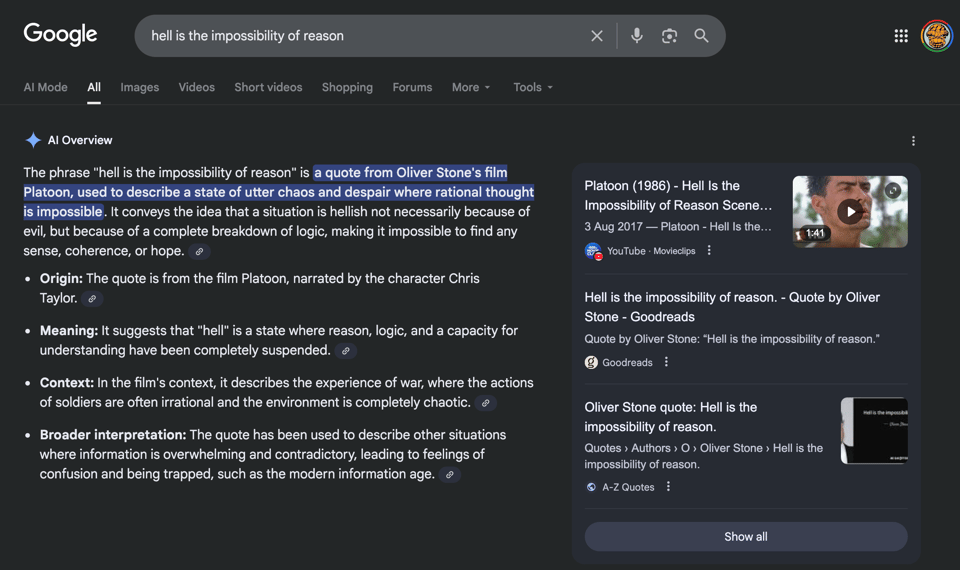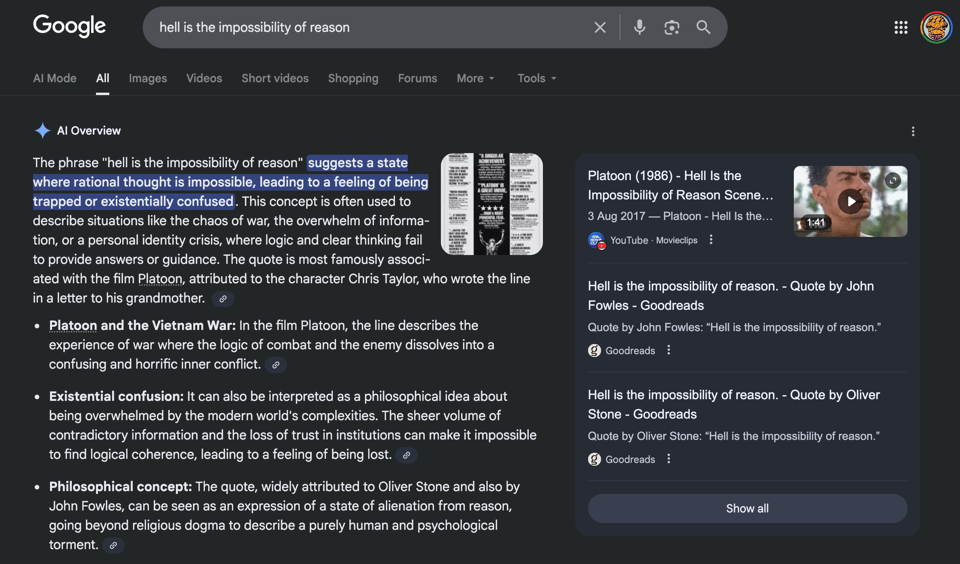Ridiculous Opinions #305
2025-10-26

Sunday morning and I’m a day late with my newsletter. Whoops!
A couple of days ago, I saw in the news that the ridiculous president of the United States was suspending all trade talks with Canada because of a Canadian ad aired in the United States about the tariffs. And when I read this, I wanted to use a quote that I had remembered for years from Oliver Stone’s film, “Platoon”. The quote is as such:
So, I was going to start off this newsletter with that quote. But then I realized that Stone was quoting someone else, so I decided to do a bit of research on who originally said it. And then a horrible revelation came to me…it was difficult to find who originally said it.
I mean, it wasn’t that hard, but I had to do a bit of digging to find out who originally said it (John Fowles, British novelist). And how many people are going to work that hard to find the answer to their question when there’s an A.I. summary at the top?
This quote has bounced around my head for years and years because of the truth that exists around it. However, there has to be some kind of grand irony around the quote when the first result in a Google search for it leads to the A.I.-generated notion that Oliver Stone was the first person to say it. Oliver Stone did not say it first. Apparently, John Fowles said it first. But then again, I’m not totally sure that’s true either.
Which leads us to the post-truth era in which we currently live. How do we even know what’s true anymore? Where does one get unfiltered facts when doing research? What kind of trouble will all of this lead to in the future? It’s not going to take long to find out.
One of the things that I’ve been doing in my classroom as of late is teaching media literacy. I teach a film class, of course, and it might be debatable in terms of whether or not I should be doing such a thing, but I do it nonetheless. This summer, I found a text from Finland called “The ABCs of Media Literacy” and I decided to use that as a springboard for discussions in my classroom. It’s mainly a springboard for discussion in the class. I introduce the topic, explain a bit of it, and then answer questions that students might have regarding the topic, allowing the conversation to flow back and forth as they start to think about things that they might not have thought about before.
One of the lessons was about Bots (the “B” in the alphabet). I asked how many students read comments on the internet, then I gave a quick demonstration, using A.I. to show how easy it is for the information contained in comments (Reddit, Instagram, Twitter, etc.) to be produced by an LLM. I asked Claude.ai to subtly provoke me without being outright offensive when it replied to me. It worked perfectly and illustrated a concept that they might not have thought about before: That the comments that they read on the internet might not actually be made by humans. I spent a great deal of time talking about the notion that though it may seem like those comments are by people with opinions, all it would take is a simple home computer programmed to react to certain things to populate a page with vaguely inflammatory rhetoric designed to fill you with furious rage.
But even worse, those comments might not be there to fill you with anger, but more to infect you with an idea. That’s the most dangerous part of all of this.
I have long said that there is a scientific method with which conservative people argue. That method involves zeroing in on one specific grain of truth that you cannot argue against, and thus claiming to win the argument. Is there government waste? Sure, but that’s not a reason to shut down the government. Are taxes always used on worthwhile projects? Of course not, but that’s not a reason to eliminate them. Should men use women’s bathrooms? Uh, no, but the issue is more complicated than that. By drilling down to an unassailable argument, conservatives undermine the notion that issues are complicated. Today’s problems are nuanced and actually involve thinking as opposed to reacting.
When Fox News started broadcasting in the 90s, I found it gross. Yet, I would find people watching it and saying things like, “They’re crazy, but I find it entertaining.” But what they were actually doing is indoctrinating society into a way of thinking. By planting the ideas that they have, they have shifted the discussion to the right, so that ideas that should have been conservative ideas now fall in the middle of political rhetoric as opposed to the right. The balance has been shifted.
That’s because conservative news organizations knew that all they had to do was plant an idea in our heads in order to change the way we think. An idea is like a virus. It infects your brain and must run its course before it dies off (if it ever does).
And now this problem is even worse. I say this in light of the notion that I had to do a bit of research to find who a quote should have been attributed to in a movie from 1986. The first result from Google is that it comes from Stone.
But then look at this. Here is the first result of the search:

Weirdly enough, when I went back to get the link for this newsletter, now magically the A.I. attributes it to John Fowles. Check this same search result:

These are two searches within fifteen minutes of each other. The information that you’re looking for is malleable, people. Very frightening.
We are rapidly reaching a point where we can trust nothing. I’m not sure we could ever trust this stuff, but now it’s even worse, because they’ve taught us that we should trust Google. A whole generation has grown up thinking Google is trustworthy. Now, they’re lying to us.
Where will all of this lead?

Don't miss what's next. Subscribe to Ridiculous Opinions!:



Add a comment: